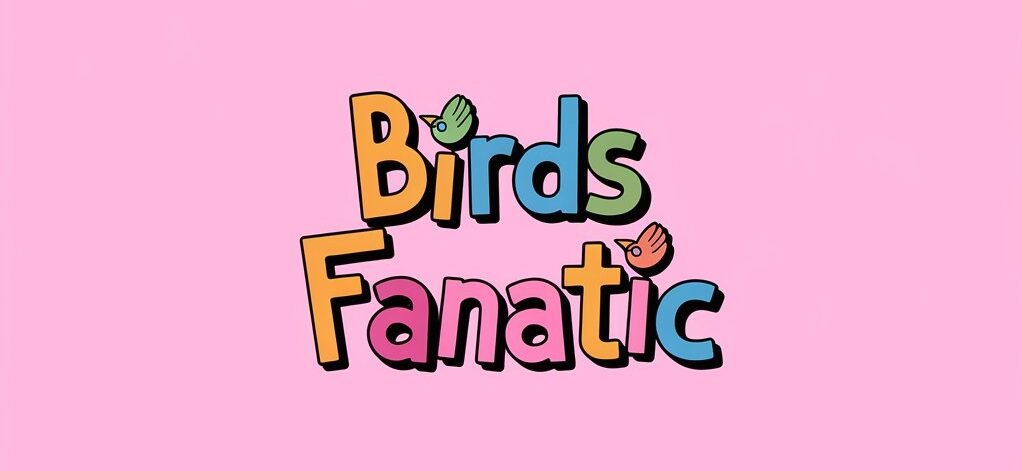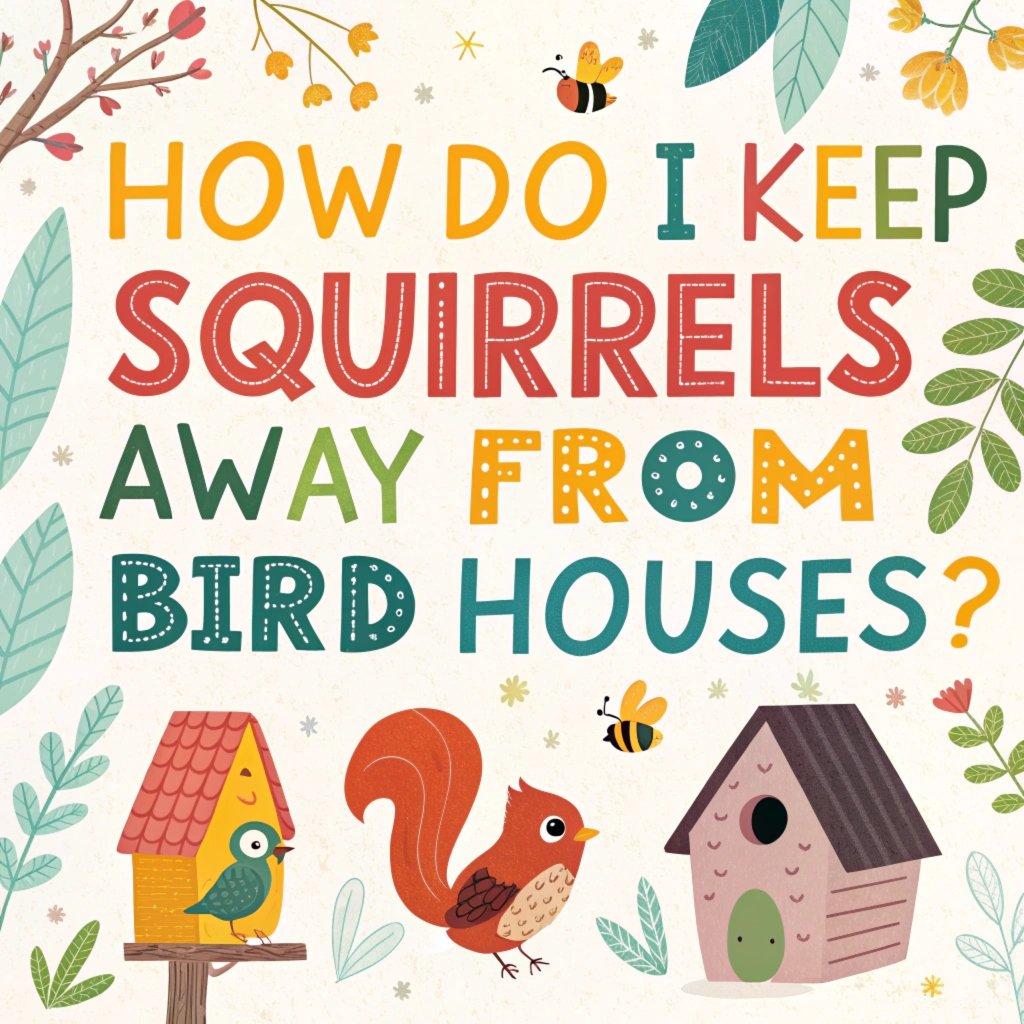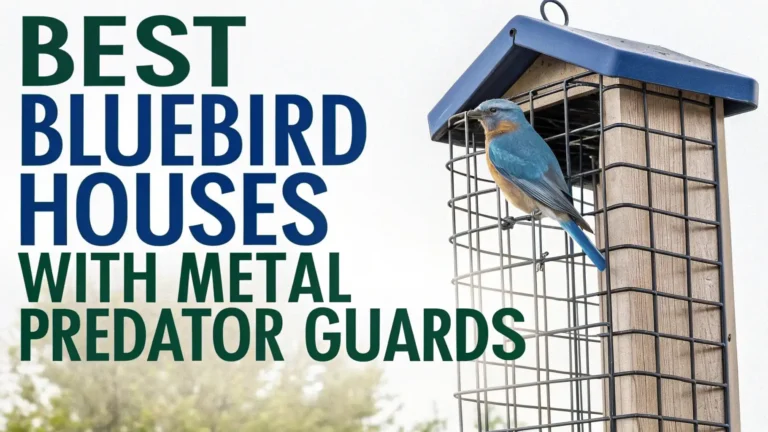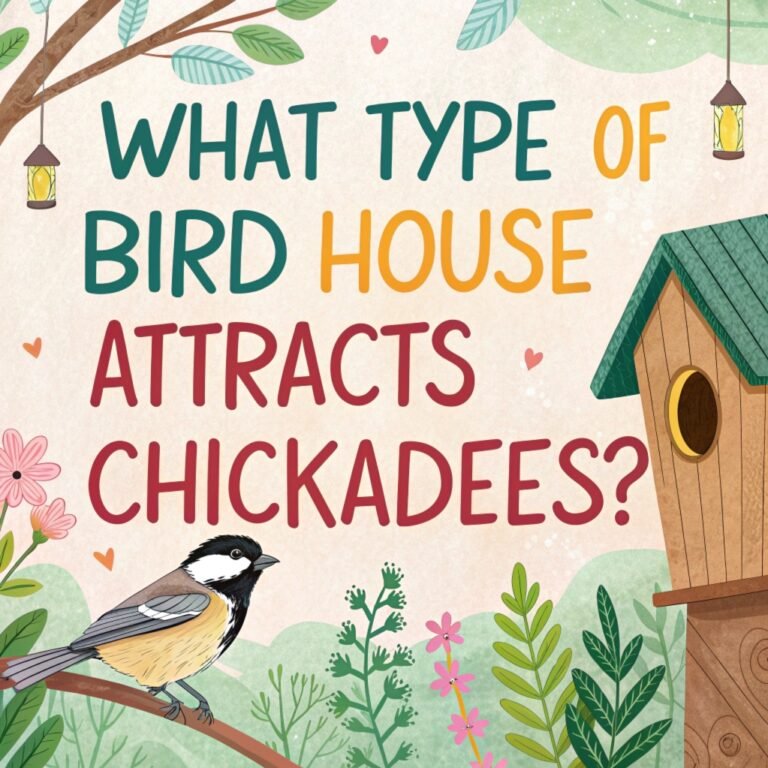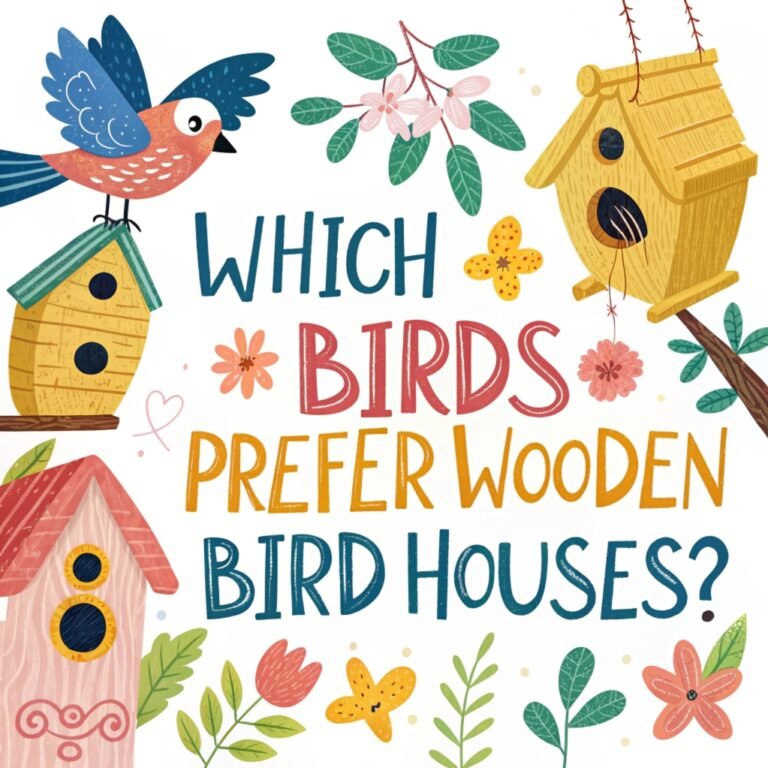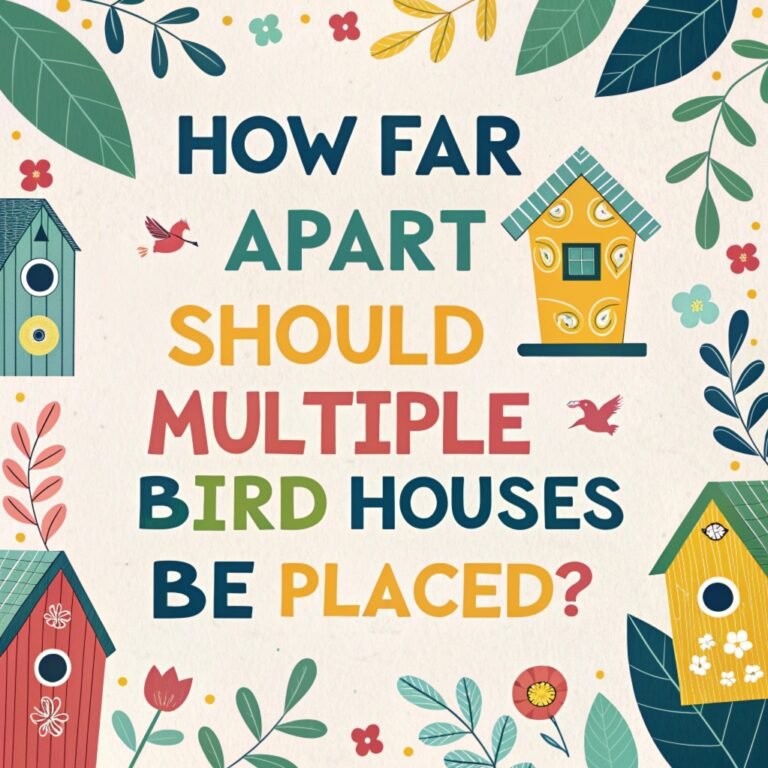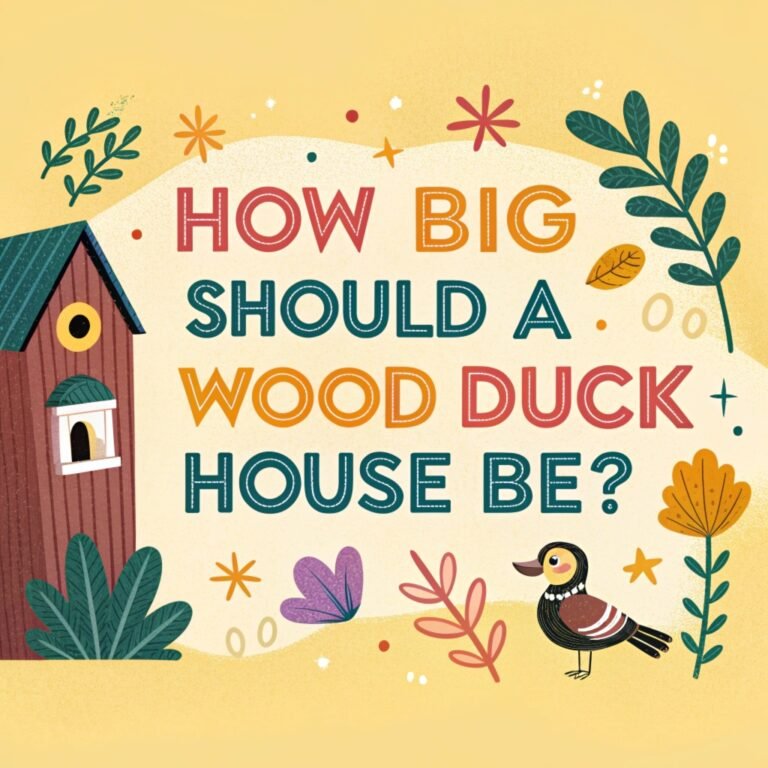How Do I Keep Squirrels Away From Bird Houses? – Effective Strategies and Tips
Keeping squirrels away from bird houses is a common challenge for bird enthusiasts. These clever creatures can cause significant damage to nesting sites and disrupt the birds you’re trying to attract.
In this comprehensive guide, we’ll explore various methods to protect your bird houses from squirrels, ensuring a safe haven for your feathered friends.
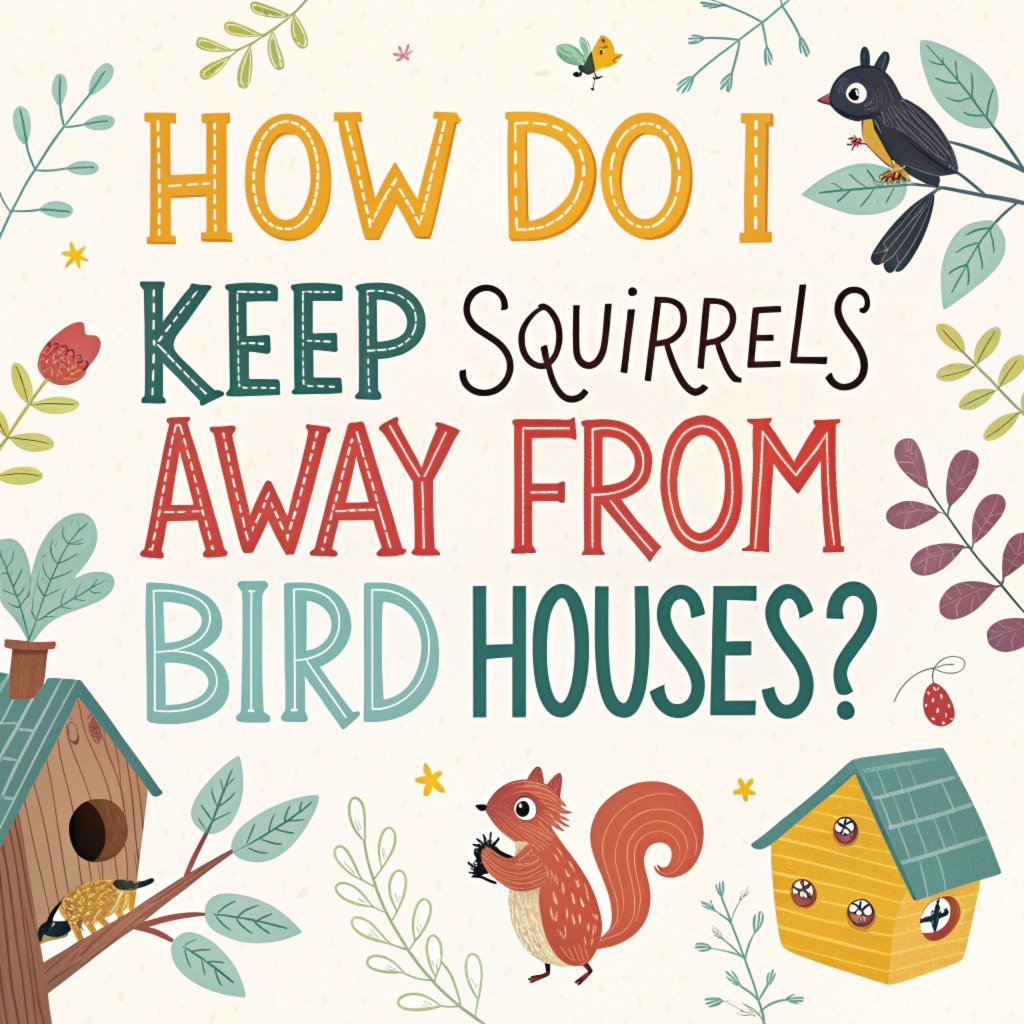
Key Takeaways:
- Strategic placement is crucial: Position bird houses at least 10 feet from trees and other launching points
- Install baffles on poles to prevent squirrels from climbing
- Use predator guards to reinforce entrance holes
- Choose squirrel-resistant materials like metal or PVC for bird house construction
- Apply natural repellents such as cayenne pepper or cinnamon spray
- Regular maintenance and cleaning around bird houses can deter squirrels
- Consider squirrel-proof designs with weight-activated mechanisms
- Provide alternative food sources for squirrels away from bird houses
- Use motion-activated deterrents to startle squirrels
- Employ natural predators by attracting owls or hawks to your yard
- Implement physical barriers like wire mesh cages around bird houses
- Monitor and adapt your strategies as squirrels can be persistent and clever
Understanding Squirrel Behavior: The First Step in Protection
To effectively keep squirrels away from bird houses, it’s essential to understand their behavior. Squirrels are opportunistic and highly adaptable creatures.
They’re attracted to bird houses primarily for shelter and potential food sources. Squirrels have excellent climbing abilities and can jump considerable distances, making most elevated locations accessible to them.
Their sharp teeth allow them to chew through wood and other materials, potentially enlarging entrance holes of bird houses.
By recognizing these traits, you can better strategize your defense against these persistent creatures. Squirrels are most active during daylight hours, particularly in the early morning and late afternoon. This knowledge can help you time your observations and interventions more effectively.
Understanding their seasonal patterns is also crucial, as squirrels may be more aggressive in their search for nesting sites during breeding seasons in late winter and early spring.
Strategic Placement: Keeping Bird Houses Out of Reach
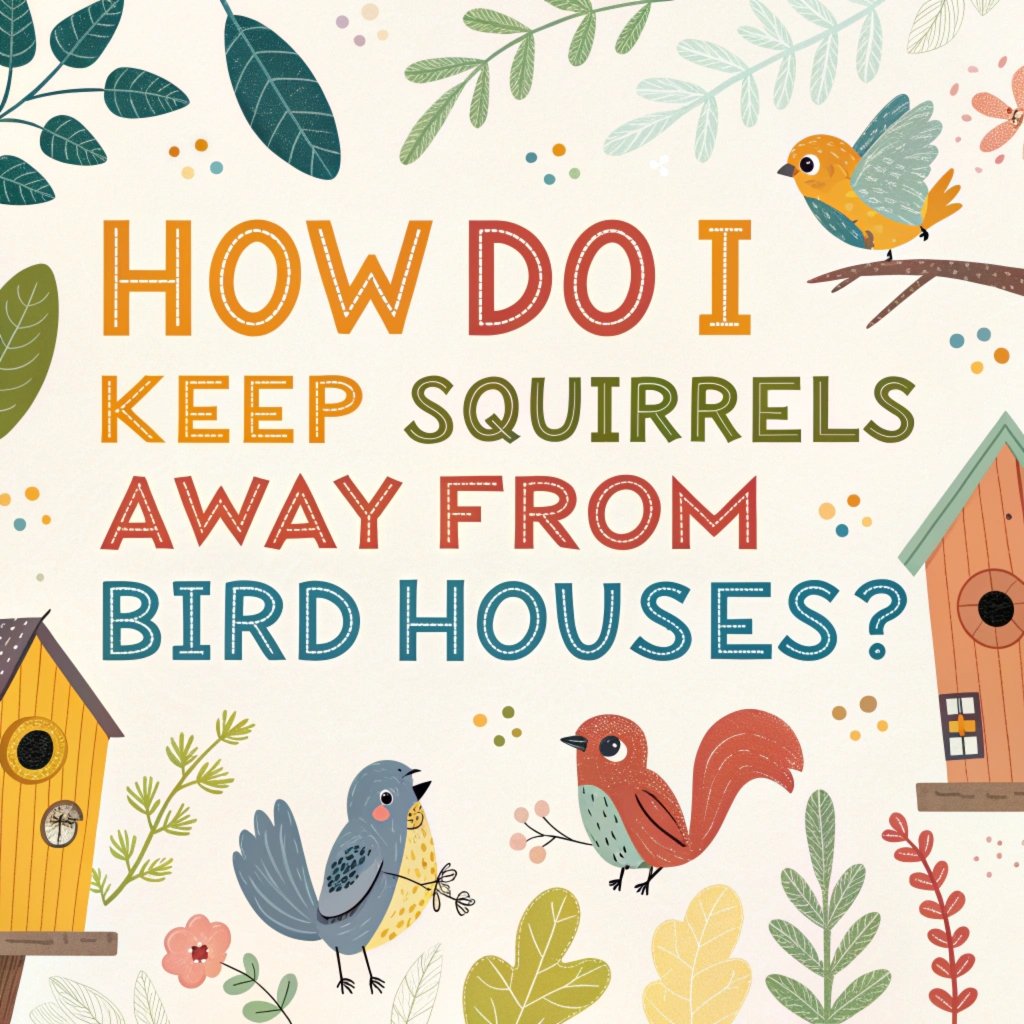
One of the most effective ways to protect bird houses from squirrels is through strategic placement. Position your bird houses at least 10 feet away from trees, fences, or any structures that squirrels could use as launching pads.
Squirrels can jump horizontally up to 10 feet, so maintaining this distance is crucial. Consider mounting bird houses on smooth metal poles rather than wooden ones, as these are more difficult for squirrels to climb.
The ideal height for a bird house is about 5 to 6 feet off the ground, which is high enough to deter ground predators but not so high that it’s easily accessible from nearby trees.
If possible, place bird houses in open areas of your yard, away from overhanging branches or wires that squirrels might use to access them.
Remember that different bird species have different preferences for nesting heights and locations, so research the specific needs of the birds you’re trying to attract when deciding on placement.
Installing Baffles: A Physical Barrier Against Climbing Squirrels
Baffles are highly effective physical barriers that prevent squirrels from climbing up to bird houses. These devices come in various shapes and sizes, but all serve the same purpose: to create an obstacle that squirrels can’t navigate around.
Cone-shaped baffles are particularly effective when installed on poles below bird houses. They should be placed at least 4 feet off the ground and have a diameter of at least 15 inches to be effective.
For bird houses mounted on trees, consider using wrap-around baffles that encircle the trunk. These cylindrical barriers should be at least 2 feet long and placed high enough that squirrels can’t jump over them from the ground.
When installing baffles, ensure there are no gaps or edges that squirrels could use to gain purchase. Regular maintenance of baffles is important, as squirrels may attempt to chew through or find weak points over time.
By combining baffles with strategic placement, you create a formidable defense against even the most persistent squirrels.
Reinforcing Entrance Holes: Predator Guards for Added Protection
Predator guards are essential accessories for protecting bird houses from squirrels and other unwanted visitors. These metal or slate rings are designed to reinforce the entrance hole of the bird house, preventing squirrels from enlarging it or gaining access.
When selecting a predator guard, ensure it’s made of durable, chew-resistant material like metal or hard plastic.
The guard should fit snugly around the entrance hole, leaving no gaps for squirrels to exploit. Some predator guards also feature a slightly extended lip that makes it difficult for squirrels to reach inside the bird house.
When installing a predator guard, make sure it doesn’t interfere with the birds’ ability to enter and exit the house comfortably.
Regular inspection of predator guards is important, as persistent squirrels may attempt to damage or dislodge them over time.
By combining predator guards with other protective measures, you significantly enhance the security of your bird houses against squirrel intrusions.
Choosing Squirrel-Resistant Materials: Building Better Bird Houses
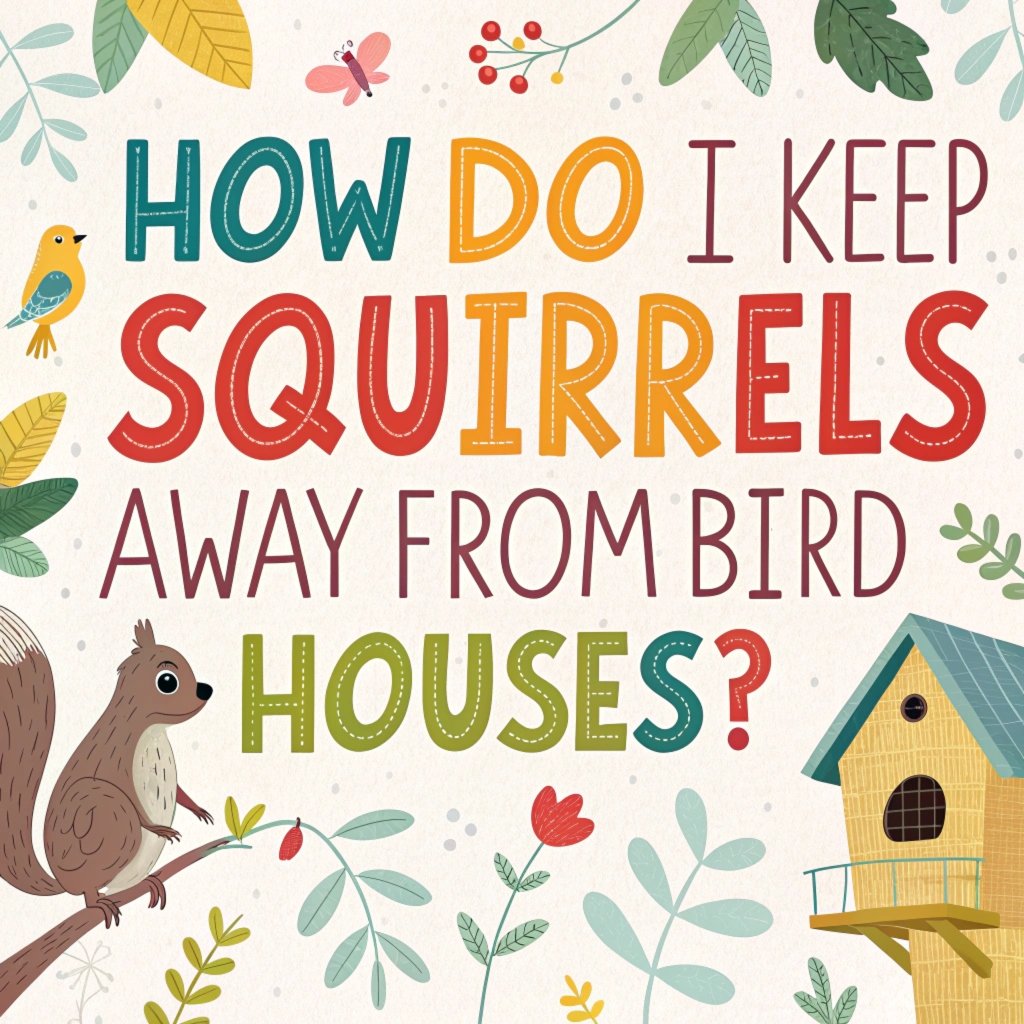
The materials used in constructing bird houses can play a significant role in deterring squirrels. Opt for durable, squirrel-resistant materials when building or purchasing bird houses.
Metal, particularly aluminum or galvanized steel, is an excellent choice as it’s difficult for squirrels to chew through.
If you prefer a more natural look, consider using cedar or cypress wood, which are naturally resistant to decay and less appealing to squirrels. PVC is another good option, as it’s lightweight, durable, and unappealing to squirrels.
When using wood, avoid soft varieties like pine that squirrels can easily damage. Regardless of the material chosen, ensure that all joints and seams are tightly sealed to prevent squirrels from prying them apart.
Regularly inspect your bird houses for any signs of wear or damage, and make repairs promptly to maintain their squirrel-resistant properties. By choosing the right materials, you can significantly reduce the likelihood of squirrel intrusions and extend the lifespan of your bird houses.
Natural Repellents: Using Scents and Tastes to Deter Squirrels
Natural repellents can be an effective and environmentally friendly way to keep squirrels away from bird houses. Squirrels have a strong aversion to certain scents and tastes, which you can use to your advantage.
A popular homemade repellent is a mixture of cayenne pepper and water, which can be sprayed around the bird house and on nearby surfaces.
The spicy smell and taste deter squirrels without harming birds. Similarly, a cinnamon spray can be effective, as squirrels dislike this strong scent.
Peppermint oil is another natural repellent that can be mixed with water and sprayed around the area. For a longer-lasting effect, consider planting mint or marigolds near your bird houses, as these plants naturally repel squirrels.
Remember to reapply these natural repellents regularly, especially after rain, to maintain their effectiveness. While using these methods, monitor your bird houses to ensure the repellents aren’t inadvertently deterring the birds you’re trying to attract.
Regular Maintenance: Keeping the Area Clean and Unattractive to Squirrels
Regular maintenance of the area around your bird houses is crucial in deterring squirrels. Squirrels are attracted to areas with abundant food sources, so keeping the ground clean of fallen seeds and debris is essential.
Regularly rake up any fallen seeds, nuts, or fruits from under bird feeders and trees near your bird houses. This not only reduces the attraction for squirrels but also helps prevent the spread of diseases among birds.
Trim back any branches or vines that might provide squirrels with easy access to your bird houses. Consider using squirrel-proof bird feeders in the vicinity of your bird houses to minimize the overall squirrel activity in the area.
If you have fruit trees or berry bushes, harvest the produce promptly to avoid attracting squirrels. Regularly inspect your bird houses for any signs of damage or attempted entry by squirrels, and make repairs as needed.
By maintaining a clean and well-managed environment around your bird houses, you significantly reduce their appeal to squirrels.
Squirrel-Proof Designs: Innovative Solutions for Bird House Protection
Incorporating squirrel-proof designs into your bird houses can provide an additional layer of protection. Many innovative designs use weight-activated mechanisms that close access to the entrance when a heavier animal, like a squirrel, attempts to enter.
These designs typically feature a perch connected to a spring-loaded door that closes under the weight of a squirrel but remains open for lighter birds.
Another effective design includes extended roof overhangs that make it difficult for squirrels to reach down into the entrance hole. Some bird houses feature smooth, slippery exteriors or conical shapes that squirrels find challenging to climb.
When selecting or building a squirrel-proof bird house, ensure that the design doesn’t compromise the comfort and safety of the birds you’re trying to attract.
Regularly test the mechanisms of squirrel-proof designs to ensure they’re functioning correctly. By combining these innovative designs with other protective measures, you create a multi-layered defense against squirrel intrusions.
Alternative Food Sources: Distracting Squirrels Away from Bird Houses
Providing alternative food sources for squirrels can be an effective strategy to keep them away from bird houses. By setting up dedicated squirrel feeders in a different part of your yard, you can divert their attention and satisfy their foraging instincts.
Choose a location far from your bird houses for these feeders, ideally near the edges of your property or close to wooded areas where squirrels naturally feel more comfortable. Stock these feeders with foods that squirrels find irresistible, such as corn, peanuts, or sunflower seeds.
Some gardeners even plant extra fruit trees or berry bushes specifically for squirrels. While this method may seem counterintuitive, it can significantly reduce the pressure on your bird houses.
However, be mindful not to overfeed squirrels, as this could lead to an increase in their population. Monitor the squirrel activity in your yard and adjust the amount and type of food offered accordingly.
By providing alternative food sources, you create a win-win situation where both birds and squirrels can coexist in your yard without conflict.
Motion-Activated Deterrents: Startling Squirrels Away
Motion-activated deterrents can be highly effective in keeping squirrels away from bird houses. These devices use sensors to detect movement and then trigger a response that startles or scares away the squirrels.
One popular option is a motion-activated sprinkler, which releases a sudden burst of water when a squirrel approaches. This not only startles the squirrel but also creates an unpleasant experience that discourages future visits.
Another effective deterrent is a motion-activated ultrasonic device that emits high-frequency sounds unpleasant to squirrels but inaudible to humans and most birds.
Some gardeners use motion-activated lights or even small, harmless electric shocks to deter squirrels. When using these devices, position them strategically around your bird houses for maximum effectiveness.
It’s important to regularly change the location of these deterrents, as squirrels may become accustomed to them over time. While these methods can be very effective, always ensure they don’t inadvertently scare away the birds you’re trying to attract.
Natural Predators: Encouraging Nature’s Own Squirrel Control
Encouraging natural predators in your yard can be an effective and eco-friendly way to control squirrel populations around your bird houses. Owls and hawks are natural predators of squirrels and can help keep their numbers in check.
To attract these birds of prey, consider installing owl nesting boxes or hawk perches in your yard. These structures should be placed away from your bird houses to avoid frightening smaller birds.
Creating a diverse habitat with native plants can also attract a variety of predators that may help control squirrel populations.
Avoid using pesticides in your yard, as these can harm beneficial predators along with pests. While this method requires patience and a long-term approach, it can lead to a more balanced ecosystem in your yard.
Remember that predators will also hunt other small animals, including birds, so monitor the impact on your local bird population.
By encouraging natural predators, you’re not only addressing the squirrel issue but also promoting biodiversity in your backyard.
Physical Barriers: Using Wire Mesh and Cages
Implementing physical barriers like wire mesh and cages can provide robust protection for your bird houses against squirrels. Wire mesh cages can be constructed around the bird house, with openings large enough for small birds to enter but too small for squirrels.
When designing these cages, ensure they don’t interfere with the birds’ flight paths or make them feel trapped. Hardware cloth with 1/2-inch openings is an excellent material for this purpose, as it’s durable and resistant to chewing.
For pole-mounted bird houses, consider wrapping the pole with smooth metal sheeting or installing a cone-shaped baffle below the house. If your bird house is mounted on a tree, you can create a barrier using sheet metal wrapped around the trunk below the house.
When installing any physical barrier, ensure there are no sharp edges that could harm birds or other wildlife. Regularly inspect these barriers for any damage or wear, and make repairs as needed.
While physical barriers can be highly effective, they should be used in conjunction with other methods for comprehensive squirrel protection.
Monitoring and Adapting: The Key to Long-Term Success
Continuous monitoring and adaptation of your squirrel-proofing strategies are essential for long-term success in protecting your bird houses. Squirrels are intelligent and adaptable creatures, often finding ways around obstacles over time.
Regularly observe the activity around your bird houses, noting any changes in squirrel behavior or new attempts to access the houses. Keep a log of your observations and the effectiveness of different methods you’ve tried.
This information can be invaluable in refining your approach. Be prepared to adjust your tactics as needed, perhaps rotating different deterrent methods to prevent squirrels from becoming accustomed to any one approach.
Stay informed about new squirrel-proofing products and techniques by joining local birding groups or following relevant online forums.
Remember that what works in one season may not be as effective in another, so be prepared to modify your strategies throughout the year.
By remaining vigilant and flexible in your approach, you can maintain a squirrel-free environment for your bird houses and ensure a safe, welcoming habitat for your feathered visitors.
Frequently Asked Questions
What is the most effective way to keep squirrels away from bird houses?
The most effective approach typically involves a combination of methods, including strategic placement, physical barriers like baffles, and using squirrel-resistant materials. Consistency and regular monitoring are key to long-term success.
Can squirrels harm birds nesting in bird houses?
While squirrels are not typically predators of birds, they can cause indirect harm by damaging nests, stealing eggs, or competing for nesting sites. Their presence can also stress nesting birds, potentially leading to nest abandonment.
Are there any plants that naturally repel squirrels?
Yes, certain plants can help deter squirrels. Marigolds, mint, nasturtiums, and daffodils are known to be unappealing to squirrels. Planting these around your bird houses can create a natural barrier.
How often should I clean and maintain my bird houses to deter squirrels?
Regular maintenance is crucial. Clean out old nests and debris at least once a year, preferably in late fall or early winter. Inspect for damage and make repairs as needed. This not only deters squirrels but also keeps the bird house healthy for its intended occupants.
Is it harmful to use chemical repellents to keep squirrels away from bird houses?
Chemical repellents can be harmful to both squirrels and birds. It’s best to stick to natural, non-toxic methods of deterrence. If you do use repellents, choose those specifically designed for bird and wildlife safety.

Hello, I’m Amelia White, the founder of birdsfanatic.com. As a lifelong bird enthusiast and spiritual seeker, I’ve always been fascinated by the mystical connections between birds and the human experience. On this site, I share my knowledge and insights into the symbolic meanings and spiritual significance of various bird species, exploring their roles in mythology, folklore, and cultural traditions. Join me on this journey into the world of birds, where we’ll discover the hidden wisdom and guidance that these magnificent creatures have to offer.
